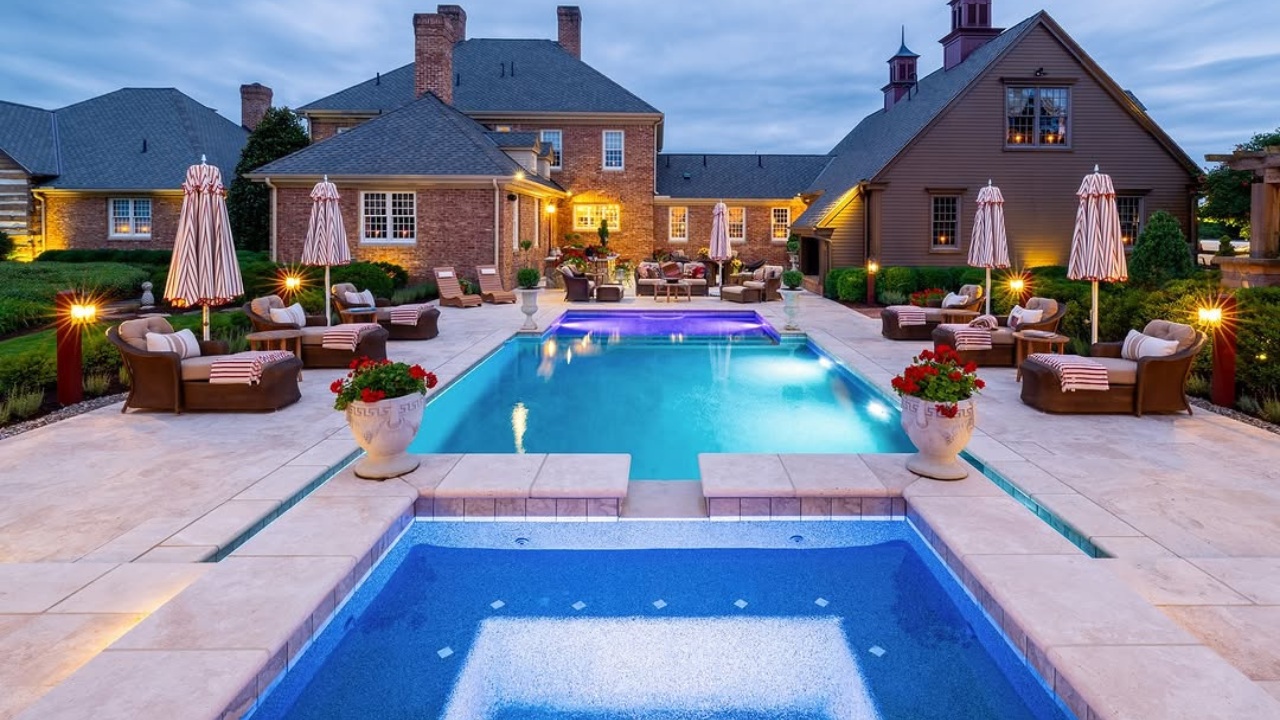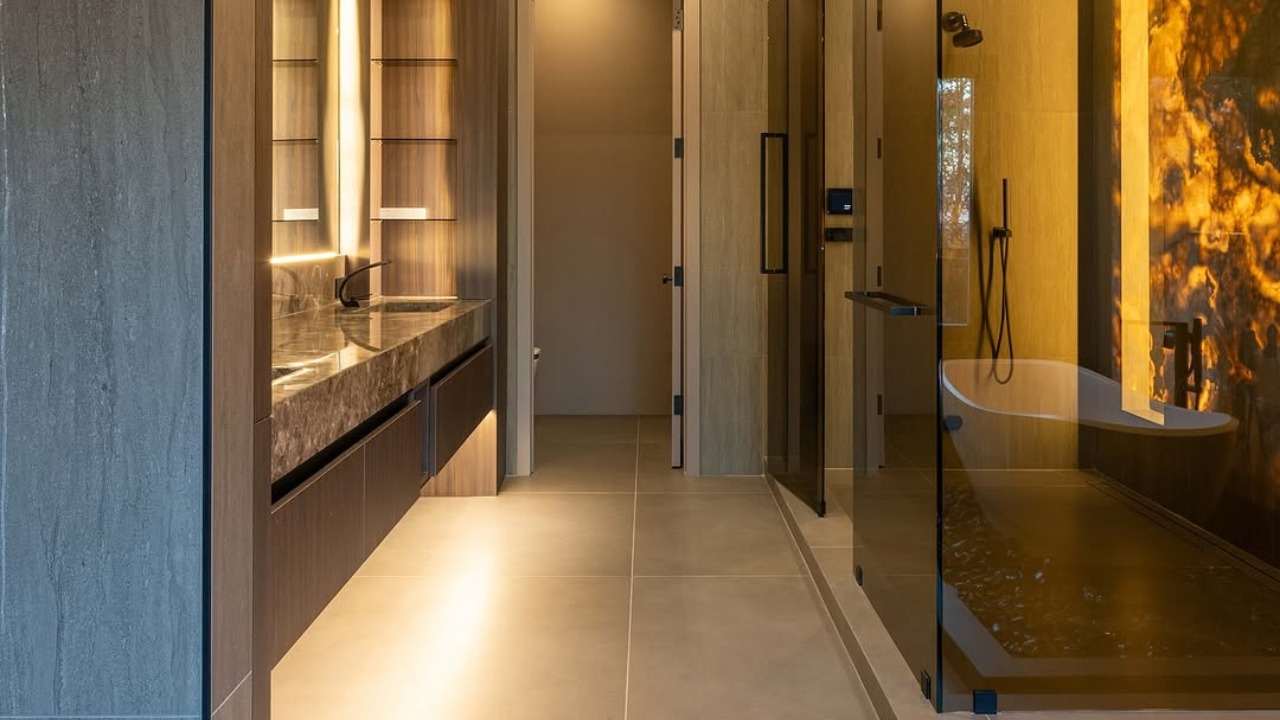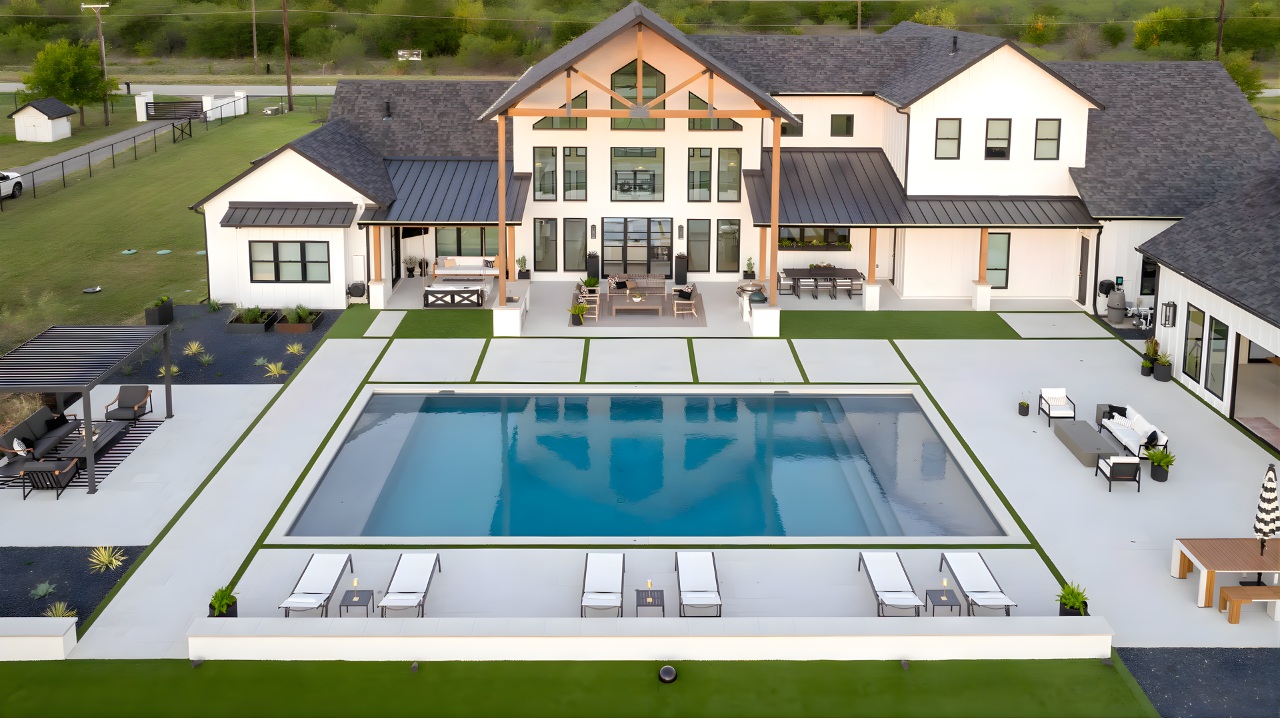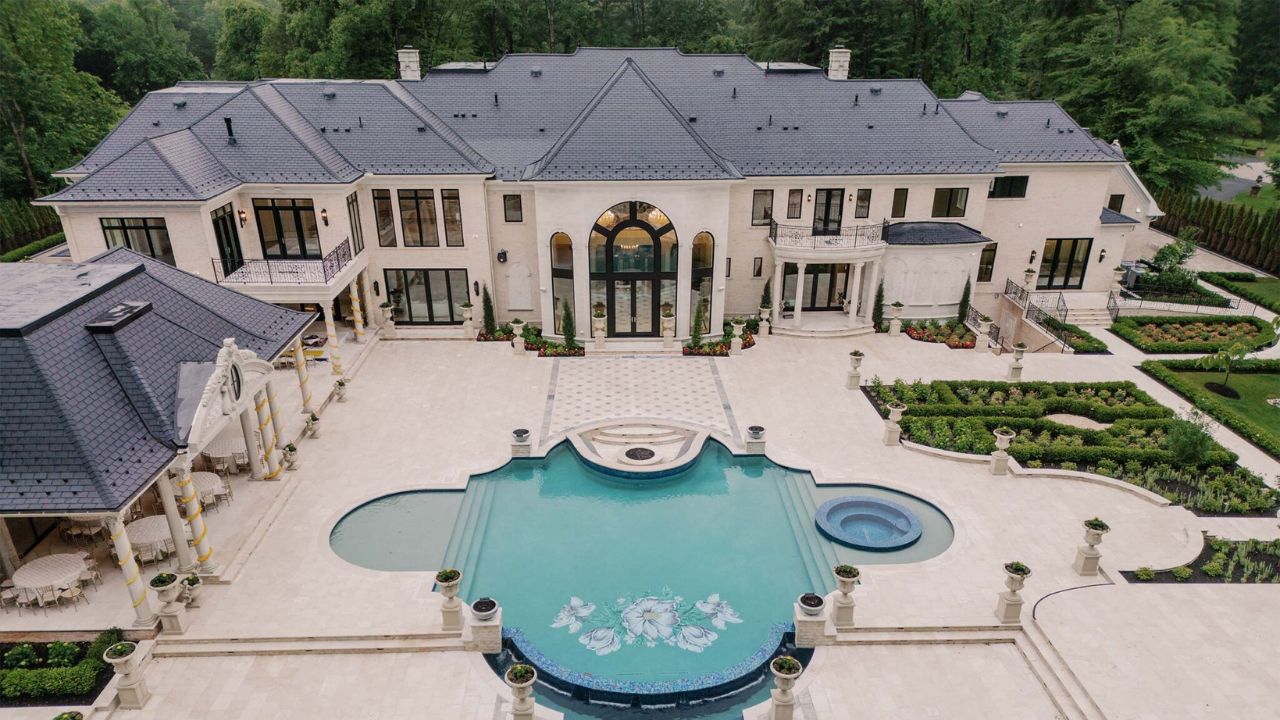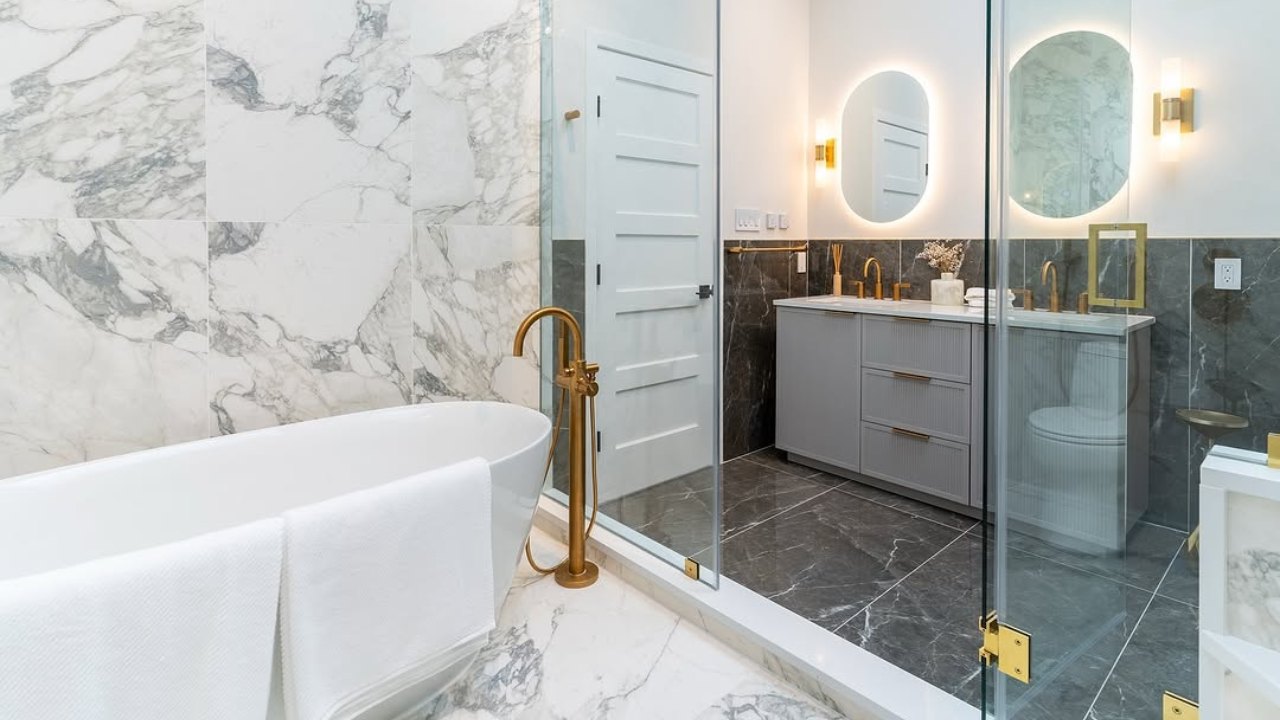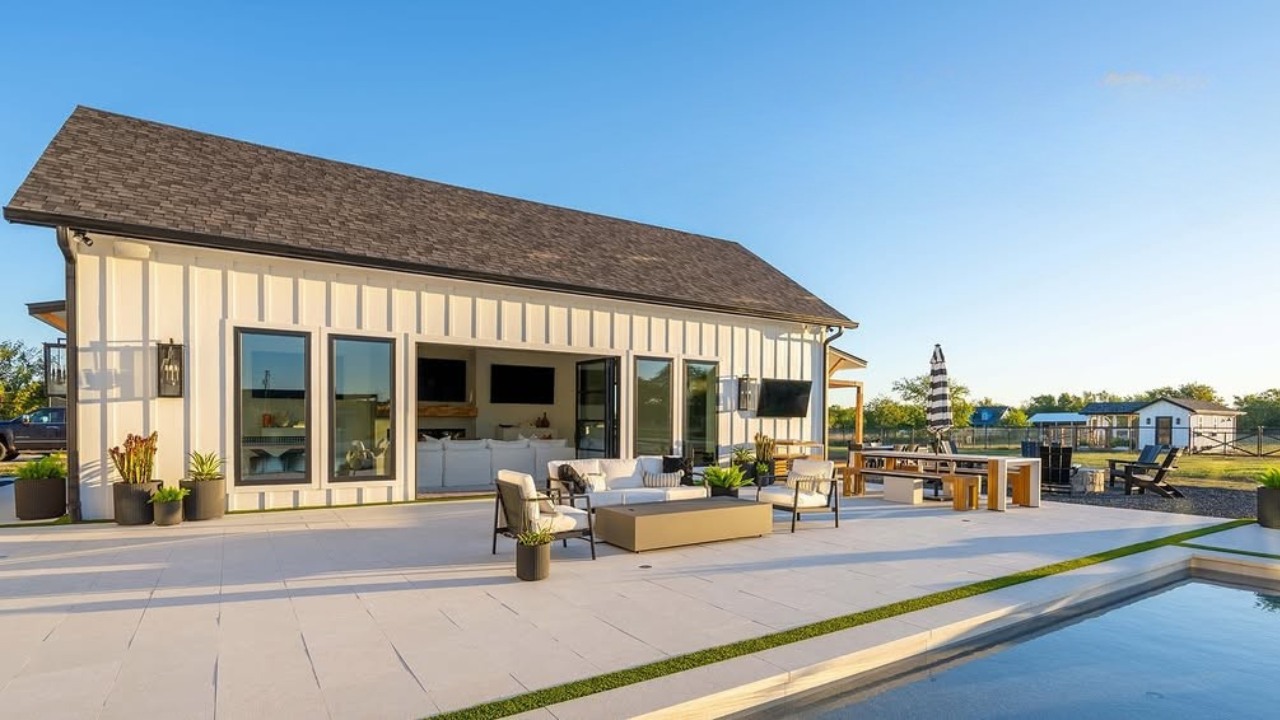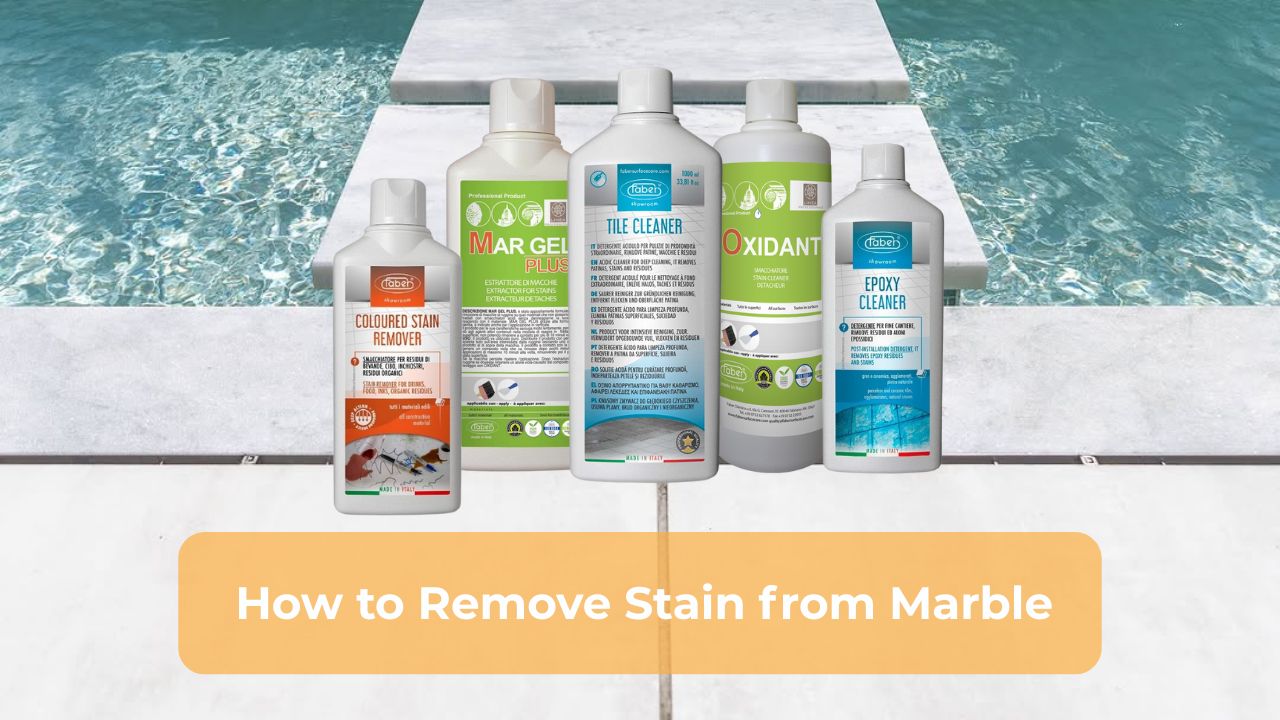Travertine is one of the most beautiful material choices for the pool decks. These days, it is gaining popularity for several reasons. As a homeowner, you will want to create a pool deck that not just looks good but also offers safety and functionality. A pool deck is more than just a pool frame. It shapes how people move, rest, and gather. Travertine pavers have all these elements along with it’s distinct natural appearance. At NT Pavers, we have seen how natural stones are a preferred choice for many homeowners for real outdoor performance. This is why it is often asked why travertine is good for pool decks. Here is what you need to know.

Benefits Of Travertine For Pool Decks
Travertine stone is a great choice for pool decks, and here is why you should choose it.
Travertine Stays Cool Under Direct Sunlight
One of the major parts of summer afternoons is the swimming pool fun. However, most pool decks are exposed to direct sunlight. Materials like porcelain and concrete pavers absorb more heat and become unbearable to walk barefoot on. Travertine is much different in this scenario. The naturally porous surface releases the heat instead of storing it. This structure keeps the surface cooler even during long summer afternoons.
The cooling effect makes it a perfect choice for families who walk barefoot without discomfort. It also reduces the heat retention around the pool. Many contractors still call travertine the “barefoot stone” for this reason. For aged decks, travertine restoration helps renew the surface and cooling properties.
Natural Slip Resistance Makes the Deck Safer
Pool decks often have to stay wet. Children run while parents move fast. When the surface doesn’t have the texture, it will be prone to slipping. Travertine offers a firm grip because water stays inside its natural pores instead of sitting on top. Travertine pool decks hold friction even when wet.
Compared to limestone, tumbled travertine particularly offers a more secure feel because the edges soften during production. The stone has a slightly textured profile. This texture makes steps, diving areas, and shallow areas. For edge finishing and design harmony, consider pool coping or explore creative pool coping ideas.
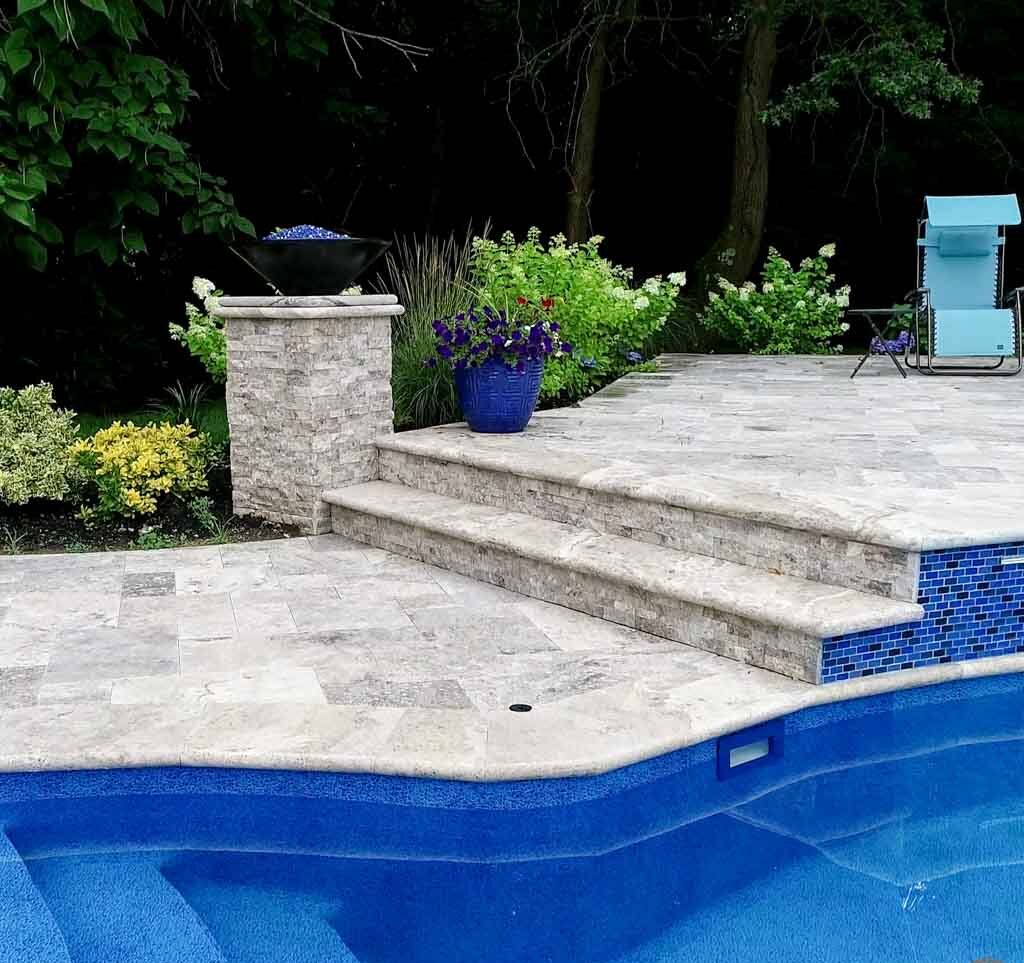
Travertine Absorbs Water Quickly
Travertine secures water into its pores instead of letting it pool on the surface. The fast absorption keeps the deck dry and lets it dry quickly. It also prevents slippery patches from forming in high-traffic areas.
In the humid areas, the porous nature of stone still performs well because it does not trap the moisture but ventilates. With proper sealing, you can add longevity without blocking the stone’s natural breathability. Make sure your installation includes a compacted paver base for better stability and drainage.
Freeze–Thaw Stability Protects the Deck in Cold Regions
Travertine can withstand freeze-thaw cycles effortlessly. Among other natural stones, it performs comparatively great. When water seeps and freezes into the surface of marble and concrete, it causes cracks. Travertine resists these cracks because its pores offer space for expansion.
Homeowners in the colder regions or with harsh winter climates often choose travertine for this reason. It withstands rapid temperature changes efficiently. NT Pavers supplies premium-grade travertine that meets higher density standards, which strengthens this natural advantage. If cracks do appear, professional travertine repair can restore the stone’s strength and look.
Travertine Resists Chlorine, UV Rays, and Pool Chemicals
Pool water contains salts and chlorine. The deck surface needs to resist this exposure. The travertine surface doesn’t get affected because UV rays cannot fade the stone easily. Thanks to its calcium-rich composition, it can withstand outdoor chemicals better than many manufactured materials.
When properly sealed, travertine forms a protective layer that blocks deep staining. Sunblock, tanning oils, and beverages will not cause much impact on he surface when the stone receives proper maintenance. For pool edges, travertine pool coping offers both durability and visual continuity.
A Long Lasting Look For Improved Outdoor Design
A pool deck should be functional, undoubtedly, but it should also offer aesthetics, too. Travertine features a calm, earthy, and natural tone. It blends perfectly with other natural elements like wood and plants. The soft veining and earthy colors match modern, Mediterranean, rustic, and luxury designs. Designers often choose travertine because the stone pairs well with:
- Infinity pools
- Waterfalls
- Outdoor kitchens
- Patio extensions
- Retaining walls
- Fire pits
Travertine naturally has an aged look, but with the passage of time, it ages gracefully. Even when it gains a patina, it still looks inviting. Routine travertine tile cleaning helps preserve its texture and color over time.
Durability With Reduced Replacement Costs
Unlike marble or concrete, travertine is one of the most durable natural stones. The pool deck is one of the most used spaces in modern houses. It has to face water, chairs, chemicals, dragging loungers, and foot traffic. Travertine handles these stresses without losing its structure. Cracks remain rare. Surface wear stays minimal.
If installed properly over a compacted base and polymeric sand joints, the deck can last for decades. This long lifespan often leads homeowners to choose travertine when they want a long-term investment that stays stable over time. For professional installation, look for travertine installers near me who specialize in travertine flooring.
Popular Pool Deck Materials Compared: Travertine vs Porcelain vs Marble
While looking for pool deck materials, you will also come across travertine vs marble and travertine vs porcelain. They are also a popular choice for many homeowners as pool deck material. However, where travertine stands out comparatively, check the table below to find out.
| Feature | Travertine | Porcelain Pavers | Marble |
| Heat Retention | Stays cooler because pores release heat; ideal for barefoot use | Retains more heat on strong summer days; less cool than travertine | Feels hotter than both travertine and porcelain |
| Slip Resistance | Natural texture provides a strong grip, even when wet | Depends on slip rating; outdoor-rated porcelain grips well but may feel smoother when wet | Smooths with age; becomes more slippery around water |
| Durability | Handles freeze–thaw cycles well; pores allow safe expansion | Dense and non-porous; strong but can crack under sudden temperature shifts | Strong density but prone to freeze–thaw cracking |
| Water Absorption | Absorbs water into pores, dries fast | Very low absorption; water stays on the surface | Lower absorption than travertine, but veins can hold moisture |
| Chemical & UV Resistance | Resists pool chemicals and UV rays when properly sealed | Excellent UV and chemical resistance | Sensitive to chemicals; can etch and discolor |
| Maintenance | Needs occasional sealing; easy long-term care | No sealing needed; very low maintenance | Needs frequent sealing; stains and etches easily |
| Aesthetic | Natural variation; soft, earthy tones; blends with outdoor environments | Uniform patterns; modern look; consistent color | Formal, polished look; dramatic veining |
| Comfort Underfoot | Cool and comfortable for barefoot areas | Can heat up in direct sun | Warmer surface; not ideal for poolside |
| Cost Range | Mid-range natural stone pricing | Mid-range to premium, depending on design | Often more expensive due to quarrying and polishing |
| Best Use Cases | Pool decks, patios, high-sun outdoor spaces | Modern homes, low-maintenance installs, design uniformity | Indoor floors, entryways, and luxury bathrooms |
| When It Works Better | High sun exposure, homes with children, and barefoot use | Homeowners wanting consistent color and minimal Maintenance | Homeowners seeking formal elegance indoors |
Travertine stays cool under direct sun exposure, doesn’t absorb water, and handles weather changes effortlessly compared to marble. While porcelain is more durable, the polished finish is not as slip-resistant as travertine. Also, it offers a better and authentic natural stone look compared to porcelain.
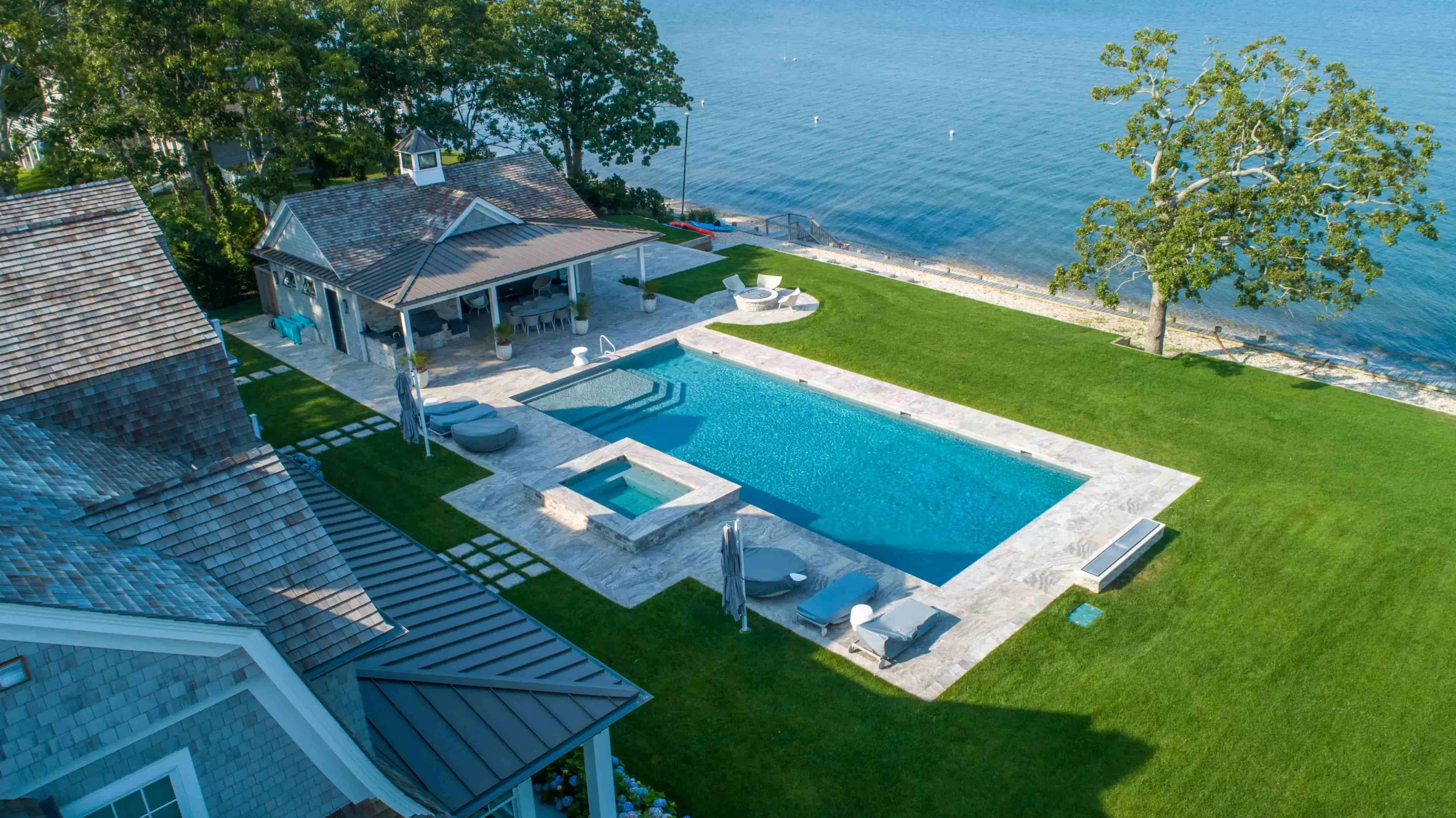
Travertine Pool Decks Benefit FAQs
Let’s answer your questions about why travertine is good for pool decks.
Is travertine safe around a pool?
Yes. Travertine is one of the safest natural stones for wet areas. The pores create natural traction, and the surface dries fast.
Does travertine feel hot on bare feet?
Travertine pool decks stay cooler than concrete, porcelain, and marble. The structure releases heat instead of storing it.
How long does a travertine pool deck last?
40-50 years or even more when installed and maintained properly.
Does travertine need sealing?
Yes. A quality sealer protects the stone from tanning oils, beverages, and chemical exposure.
Will travertine crack in winter?
No. Travertine resists freeze–thaw cycles because its pores allow ice to expand.
Is travertine better than porcelain for pool decks?
Yes. Travertine remains cool and offers natural traction when wet also requires regular sealing. Porcelain gets hot easily, and the polished surface often gets slippery when wet. The choice depends on design goals and climate.
Can travertine handle saltwater pools?
Yes. Travertine handles saltwater well when sealed. Many coastal homes use it for pool decks and patios.
What colors does travertine come in?
It motley comes in warm earthy tones like ivory, walnut, silver, noche, gold, and light beige tones. Each piece holds unique veining.
Is marble or travertine better for a pool deck?
Travertine is a better choice for a pool deck than marble. It has better thermal insulation properties, cost cost-effective, and performs well in wet areas, unlike marble, which requires frequent sealing and maintenance.
Does mold grow on travertine?
Yes. Because of its porous surface, it is prone to growing mold. Proper sealing can prevent mold growth.
What damages travertine?
Acidic substances like vinegar and lemon juice, along with sharp and heavy objects that cause scratches.
How often should you reseal travertine?
Every 1-3 years, depending on its usage.
Which type of tile is not recommended for outdoor use
Ceramic tile is not recommended for outdoor use due to its lack of weather resistance. It can crack in harsh cold and on polished surfaces, becoming a slip hazard.
How much would a 20×20 composite deck cost
Almost $12,000 to $24,000 after professional installation, where material cost may reach up to $6500 to $12000
What is the best stone for a pool deck?
Travertine is the best material for pool decks for any setting.
Transform Your Space with Premium Stone & Porcelain Pavers
Backed by Double Quality Control. Available Across the USA.
Bottom Line
If you also wonder why travertine is good for pool decks, then this is your answer. Travertine pavers stay cool in summer, absorb water easily, prevent water pooling, and withstand different weather changes. Despite being natural stone, it offers great resistance against pool water, salt, and chlorine damage. However, it does require professional installation and sealing to maintain its beauty. But once it is done properly, travertine pool decks can last 30-50 years. Just make sure to contact a reputable natural stone supplier to get premium quality travertine for your pool area. It will hold its structure for decades and bring natural beauty to outdoor design.

